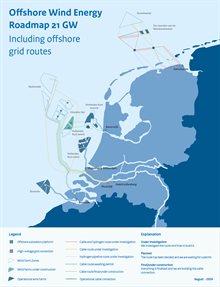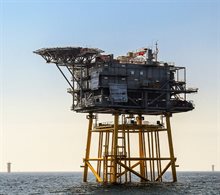Offshore Grid
Under the terms of the Electricity Act 1998, TenneT is the designated operator of the offshore grid. TenneT is responsible for connecting the new offshore wind farms to the national high voltage network and for distributing the electricity generated by wind. From 2019 onwards TenneT will be installing identical platforms in the North Sea wind farm zones.
Two platforms in the Borssele wind farm zone, two platforms in the Hollandse Kust (south) zone and one platform in the Hollandse Kust (north) zone have now been completed. Wind farm Hollandse Kust (noord) was the last to be completed at the end of 2023, which means that all wind farms from Roadmap 2023 now supply electricity. In the coming period, TenneT will be working on the platforms for the wind farms of Roadmap 21 gigawatts (2033). The standardisation of these platforms ensures that there will be a significant saving on the costs of development, construction and maintenance.
The offshore grid has the following infrastructure per wind farm:
- an offshore platform (transformer substation)
- electricity cables from the platform, through the seabed and underground from the coastline to a new transformer substation
- a transformer substation near to an existing high voltage station
- an (underground) connection to the high voltage electricity grid
Legend:
- 66 kV kabel 66 kV cable (orange)
- 220 kV kabel 220 kV cable (green)
- landelijk transportnet national electricity distribution network (blue)
Platforms
Each platform can accept a connection of a total of 700 MW, via two 220 kV alternating current cables. The energy generated by the wind farms is collected at the platform and transmitted to a high voltage station on land. Before that substation can be connected, the energy is converted from alternating current to direct current by means of a transformer substation. The cables lie in the sea bed and, from the coastline, are fed underground. The wind energy is then distributed to households in the Netherlands via the national 380 kV high voltage network.
TenneT is also building infrastructure for the period leading up to 2032, so that the energy generated in the offshore wind farms can be brought to the high voltage network on land. These projects started in early 2019 under the banner of the National Coordination Scheme.
At this time, it related to the Hollandse Kust (west), IJmuiden Ver alpha and beta wind farm zones, Nederwiek and Ten noorden van de Waddeneilanden.
Hollandse Kust (west) will generate 2100 MW, the two projects in the IJmuiden Ver Wind Farm Zone 6000 MW, Nederwiek 6000 MW and Ten noorden van de Waddeneilanden 700 MW.
Given the distance from IJmuiden Ver to the point at which they reach the coastline, direct current will be used rather than alternating current. The same standardisation as for the projects leading up to 2023 will again be used here, although in the case of IJmuiden Ver alpha and beta there are converter stations rather than transformer stations. As a consequence, these offshore platforms are significantly larger.
Exploratory studies
At the end of 2019 a start was made with the exploration of cable landing points for offshore wind energy (VAWOZ). This exploratory study was used to investigate how the energy from offshore wind farms yet to be built could, in future, best brought to land. This looked into the form (electrons or hydrogen molecules), the method of transmission (cable, tube or boat), the route and also the issue of where the energy could best be brought to land. VAWOZ lays the foundations for decision-making in relation to the cable landing options for which land use procedures can be started.
VAWOZ relates to two periods. The first period assesses possibilities for bringing extra wind energy to land in 2030. This acceleration is necessary if we are to meet the 2030 climate goals and assumes merely the possibilities for bringing the generated wind energy to land using electrons. In addition, we are doing a similar exploratory study for the period between 2030 and 2040, in which we are looking further at form, transmission and distribution, route and landing point. More information on VAWOZ.

Offshore Wind Energy Roadmap


